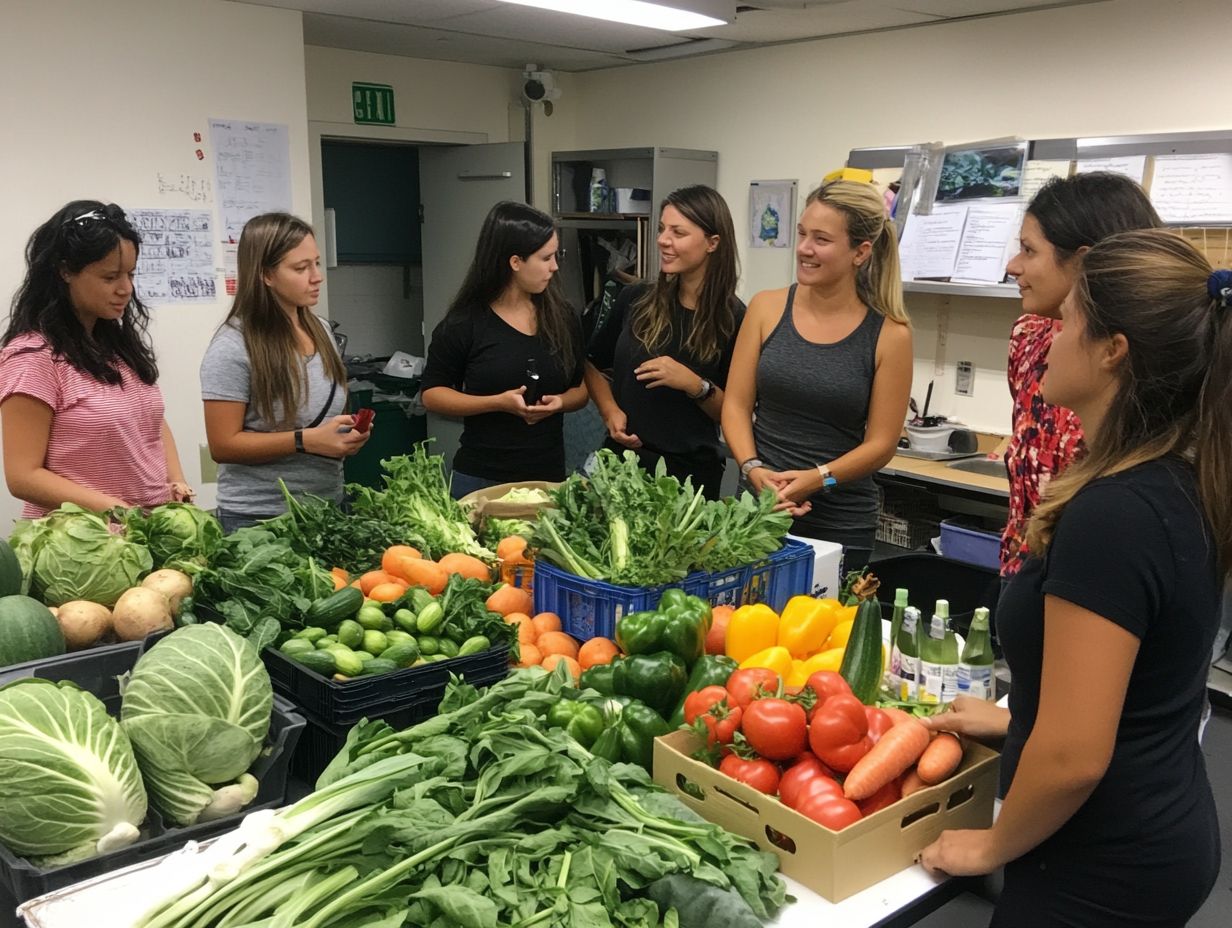What to Look for in a Holistic Nutrition Course?
Holistic nutrition embraces a comprehensive approach that highlights the intricate connections between the body, mind, and spirit in the pursuit of optimal health.
This article delves into the definition and foundational principles of holistic nutrition, revealing the advantages of enrolling in a holistic nutrition course while addressing essential considerations such as accreditation and curriculum.
Whether you aim to elevate your career or enhance your personal well-being, this guide is designed to assist you in navigating your options and thriving on your holistic nutrition journey.
Contents
- Key Takeaways:
- Understanding Holistic Nutrition
- Benefits of Taking a Holistic Nutrition Course
- Important Factors to Consider
- Choosing the Right Holistic Nutrition Course
- Tips for Success in a Holistic Nutrition Course
- Frequently Asked Questions
- What to Look for in a Holistic Nutrition Course?
- What is holistic nutrition and why is it important?
- What should I look for in a reputable holistic nutrition course?
- Is online or in-person learning better for a holistic nutrition course?
- What topics should be covered in a holistic nutrition course?
- Can I become a certified holistic nutritionist after completing a course?
Key Takeaways:

- Look for a holistic nutrition course that is accredited and has a comprehensive curriculum to ensure you are receiving quality education and training.
- Consider the cost and time commitment of the course, as well as the potential career opportunities and personal health benefits that it can provide.
- Research and compare different holistic nutrition courses to find the one that aligns with your goals and interests. Develop effective study habits and time management skills to succeed in the course.
Understanding Holistic Nutrition
Understanding holistic nutrition means recognizing the intricate connection between food, lifestyle, and overall wellness. As you delve into the world of holistic nutrition, you’ll be trained to adopt a whole-body approach.
It’s not just about what you eat. It’s also about how those food choices affect your emotional and physical health. This perspective encourages you to practice mindful eating and highlights the significance of nutrition education in reaching your personal health goals.
Definition and Principles
Holistic nutrition invites you to understand that food is merely one piece of the larger wellness puzzle, which also includes emotional health and lifestyle choices.
This approach encourages you to reflect on your overall quality of life. It takes into account how your relationships, physical activity, and spiritual practices shape not just your dietary choices, but also your emotional well-being.
For example, by recognizing the interconnectedness of these elements, you can see how nurturing strong, positive relationships can elevate your emotional state. This, in turn, influences your nutritional habits and choices.
Incorporating regular physical activity enriches this nutrient-rich landscape by enhancing your mood and energy levels. It becomes evident that true wellness emerges from a harmonious blend of these factors.
By acknowledging the significance of primary food which includes relationships, physical activity, and spiritual practices you can cultivate a more balanced, fulfilling lifestyle that promotes both your physical health and emotional well-being.
Benefits of Taking a Holistic Nutrition Course
Enrolling in a holistic nutrition course presents a wealth of benefits, offering personal growth and career opportunities in wellness coaching and health education.
By mastering holistic practices and nutrition coaching techniques, you empower clients to reach their health aspirations be it through tailored meal plans or thoughtful lifestyle modifications.
Career Opportunities and Personal Health Benefits

Completing a holistic nutrition course opens a world of diverse career opportunities for you, enabling roles as a holistic nutritionist, health coach, or wellness influencer all of which can profoundly impact your personal health journey.
In our modern era, as awareness around the significance of nutrition escalates, the demand for professionals who grasp the vital connection between food and health continues to flourish. You can explore roles that guide dietary choices and highlight the transformative benefits of holistic practices.
Whether you’re crafting tailored meal plans for clients or leading workshops on mindful eating, applying these principles can enhance well-being and foster a more balanced lifestyle. This knowledge empowers you and strengthens your relationship with food, helping you make informed choices that elevate every dimension of your life.
Don’t wait! Elevate your career and personal wellness today by exploring holistic nutrition courses.
Important Factors to Consider
When considering a holistic nutrition course, it s essential to evaluate several key factors to ensure that the program aligns with your educational and career aspirations.
Accreditation and Curriculum
Accreditation is important when selecting a holistic nutrition course. It ensures the program meets industry standards and prepares you for certification. This guarantees you receive a quality education that is recognized and respected in the field.
A strong holistic nutrition curriculum should cover essential topics such as:
- Nutritional biochemistry
- Food systems
- Dietary practices
- The therapeutic aspects of nutrition
You should explore subjects like gut health, herbal medicine, and mindfulness practices, which are vital for a well-rounded understanding of wellness. Hands-on experience through internships can significantly enhance your learning and equip you with the skills needed to navigate diverse environments, such as wellness centers or private practice.
Cost and Time Commitment
Cost and time commitment are key factors to consider when selecting a holistic nutrition course. They influence your ability to complete the program and embark on a career in this rewarding field.
As a prospective student, you ll encounter tuition fees ranging from a few hundred to several thousand dollars, depending on the institution and course depth. Additionally, materials like textbooks and online resources may add to the total cost.
The time commitment can vary; some programs offer flexible schedules for part-time study, while others may require a more intensive approach over just a few months. Understanding these financial and time investments shapes your career trajectory, impacting your job readiness, expertise, and potential to secure lucrative positions in the holistic health community.
Choosing the Right Holistic Nutrition Course

Selecting the ideal holistic nutrition course demands thorough research and thoughtful comparison of the available options. This ensures the program resonates with your health aspirations and the specific needs of your clients.
Researching and Comparing Options
Researching and comparing options for holistic nutrition courses can feel overwhelming, but it s crucial for making a well-informed choice.
Start your journey by checking the accreditation status of each institution to ensure it meets industry standards. Dive into the curriculum to confirm it includes essential topics related to holistic nutrition, such as dietary theories, wellness practices, and nutritional science.
Look closely at the faculty s credentials because experienced instructors can greatly enhance your understanding. Also, don t overlook student reviews; they provide invaluable insights into the course experience, highlighting strengths and weaknesses that might go unnoticed.
As you narrow down your options, consider your personal preferences, like whether you prefer learning in person or online. Think about how each choice aligns with your long-term career goals, such as specializing in clinical practice or coaching.
Tips for Success in a Holistic Nutrition Course
To excel in a holistic nutrition course, embrace effective study habits and master time management strategies. This will enhance your learning experience and elevate your overall achievement.
Effective Study Habits and Time Management
Effective study habits and time management can transform your experience in a holistic nutrition course! They are vital for balancing coursework, personal life, and client support seamlessly.
Consider employing techniques like the Pomodoro Technique, a time management method that uses short focused study sessions followed by breaks, to break your study sessions into manageable intervals. This approach allows for focused work while effectively preventing burnout.
Establishing a consistent study schedule not only boosts your productivity but also deepens your understanding of complex topics like meal planning and dietary regulations.
It s also important to include regular self-care practices, like mindful eating and exercise, in your routine as you navigate your studies. By nurturing your emotional health and resilience through balanced living, you will be better prepared to support your future clients on their wellness journeys.
Frequently Asked Questions

What to Look for in a Holistic Nutrition Course?
When searching for a holistic nutrition course, there are a few key factors to consider in order to find the best option for you.
What is holistic nutrition and why is it important?
Holistic nutrition is a form of healing that focuses on the whole person mind, body, and spirit and emphasizes the importance of proper nutrition for overall health and well-being.
What should I look for in a reputable holistic nutrition course?
When researching different holistic nutrition courses, it is important to look for accreditation, experienced instructors, a comprehensive curriculum, and support for students during and after the course.
Is online or in-person learning better for a holistic nutrition course?
This ultimately depends on your personal learning style and schedule. Both options can offer quality education, but it’s important to ensure that the course structure and materials meet your needs.
What topics should be covered in a holistic nutrition course?
A holistic nutrition course should cover a variety of topics, including anatomy and physiology, nutrition science, therapeutic diets, and the role of nutrition in disease prevention and management.
Can I become a certified holistic nutritionist after completing a course?
Yes, many reputable holistic nutrition courses offer certification upon completion. Be sure to research the program’s certification requirements to ensure they align with your career goals.
Ready to enhance your understanding of holistic nutrition? Explore our course offerings today!





